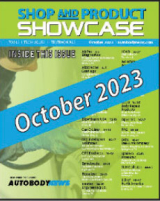State Rep. Tiffany Roberts said Question 4 on this year's ballot is a poorly-written policy that could open the state to litigation and data security risks.
Maine State Rep. Tiffany Roberts wrote a commentary for the Portland Press Herald asking voters to oppose Question 4 on this November’s ballot, which will ask them whether or not the state should require automakers to provide remote access to vehicle data to independent repairers.
“The right to repair should be protected,” Roberts wrote. “We shouldn’t have to open ourselves to security risks while doing so.”
Roberts is a Democrat representing the state’s 149th district, and the House chair of the Legislature’s Innovation, Development, Economic Advancement and Business Committee.
In February, the Maine Right to Repair coalition submitted more than 70,000 signatures supporting the referendum question, which will ask: Do you want to require vehicle manufacturers to standardize on-board diagnostic systems and provide remote access to those systems and mechanical data to owners and independent repair facilities?
The signatures were certified and the question added to the ballot.
In her commentary, Roberts said the question introduces “worrisome elements,” like an independent state government entity and a standardized platform that would allow remote access by third parties---which has never been seen before in the collision repair industry.
“This raises significant cybersecurity concerns, as it creates an attractive target for criminals or hostile actors,” Roberts said.
Roberts said in the case of a cybersecurity attack, Question 4 shifts liability from the automakers to the government entity and, ultimately, Maine citizens.
“If vulnerabilities are exploited, leading to physical harm or financial loss, the state would bear the responsibility,” Robert said. “This contradicts the National Highway Traffic Safety Administration’s cybersecurity best practices, which emphasize that manufacturers should control access to vehicle systems.”
Roberts said there has already been “significant progress in the right-to-repair arena,” referencing the pact signed in July by a trade group representing automakers and two auto service organizations ensuring independent shops would have access to the same data as dealership service centers.
“This agreement addresses many concerns raised by supporters of right to repair without the need for a referendum,” Roberts said.
Further, a similar referendum question passed by Massachusetts voters in 2020 has been in litigation ever since, as the same automaker trade group immediately challenged it. “That is not what we need in Maine,” Roberts said.
“In conclusion, Question 4 is a poorly written policy and the language alone may put the state right into litigation,” Roberts said.









